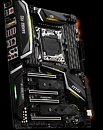Friday, June 9th 2017

MSI X299 Breaks DDR4 Memory World Record With 5500-DDR4 Speeds
Toppc Pushes the X299 Gaming Pro Carbon AC Motherboard to Reach New DDR4 Frequency Milestone
One year ago, MSI's in-house overclocker, Toppc, broke the DDR4 5GHz barrier using G.SKILL memory and the MSI Z170I GAMING PRO AC motherboard. Today, 1 year later, he raises the bar once again and became the first ever to push DDR4 speeds to 5.5GHz under liquid nitrogen cooling using the new MSI X299 GAMING PRO CARBON AC motherboard. With the MSI X299 GAMING PRO CARBON AC, MSI's most customizable high-performance Intel X299 based motherboard, Toppc was running G.SKILL DDR4 memory with an unbelievable DDR4-SDRAM clock speed of 5500MHz. This world record shows MSI's dominant position on performance for X299 by using MSI's unique and patented DDR4 Boost technology. The MSI X299 GAMING PRO CARBON AC is not only feature packed for gamers and great for case modding, it is also perfectly suited to deliver power for heavy gaming & overclocking sessions.X299 Gaming Pro Carbon AC: Perform in Style
The world's first motherboard with fully exchangeable heatsink covers and X-Mounting accessories to support 3D printing and modding, combined with the latest generation MYSTIC LIGHT RGB LEDs, makes the X299 GAMING PRO CARBON AC any modders' dream!Just activate the one-second Game boost function and performance raises to the next level like manual overclocking, without breaking a sweat. Furthermore, with the addition of 2x M.2 Shield, any fast PCI-Express SSD is sure to deliver maximum performance. With Turbo M.2 and Turbo U.2, simply connect any of the latest generation NVMe based SSDs with ease, providing you a lighting fast storage transfer experience. With unlimited customization options and packed with exclusive gaming features, the renowned GAMING PRO CARBON is ready to astonish once again in any gaming build
One year ago, MSI's in-house overclocker, Toppc, broke the DDR4 5GHz barrier using G.SKILL memory and the MSI Z170I GAMING PRO AC motherboard. Today, 1 year later, he raises the bar once again and became the first ever to push DDR4 speeds to 5.5GHz under liquid nitrogen cooling using the new MSI X299 GAMING PRO CARBON AC motherboard. With the MSI X299 GAMING PRO CARBON AC, MSI's most customizable high-performance Intel X299 based motherboard, Toppc was running G.SKILL DDR4 memory with an unbelievable DDR4-SDRAM clock speed of 5500MHz. This world record shows MSI's dominant position on performance for X299 by using MSI's unique and patented DDR4 Boost technology. The MSI X299 GAMING PRO CARBON AC is not only feature packed for gamers and great for case modding, it is also perfectly suited to deliver power for heavy gaming & overclocking sessions.X299 Gaming Pro Carbon AC: Perform in Style
The world's first motherboard with fully exchangeable heatsink covers and X-Mounting accessories to support 3D printing and modding, combined with the latest generation MYSTIC LIGHT RGB LEDs, makes the X299 GAMING PRO CARBON AC any modders' dream!Just activate the one-second Game boost function and performance raises to the next level like manual overclocking, without breaking a sweat. Furthermore, with the addition of 2x M.2 Shield, any fast PCI-Express SSD is sure to deliver maximum performance. With Turbo M.2 and Turbo U.2, simply connect any of the latest generation NVMe based SSDs with ease, providing you a lighting fast storage transfer experience. With unlimited customization options and packed with exclusive gaming features, the renowned GAMING PRO CARBON is ready to astonish once again in any gaming build





21 Comments on MSI X299 Breaks DDR4 Memory World Record With 5500-DDR4 Speeds
www.techpowerup.com/234146/g-skill-memory-breaks-ddr4-5-5-ghz-world-record-barrier
We're not going back 15 years to any period of time when people didn't understand the working of DDR memory. Nothing has changed in the last 15 years in regards to people calling the speed of DDR as the effective data rate. Or rather double that of the given clock speed in MHz. That's the way that's always been...and always will be. I don't know what cave you've been hiding in to not have noticed it. But you might as well come on out and get used to it. Things aren't likely going to conform to your warped sense of reality any time soon.
Your point is silly at best.
All I can theorize is that when DDR was new, there were many in-depth articles on the subject (as well as more trust-worthy websites for a techie to frequent) so we all used a stricter terminology. Subsequent DDR2, 3, and 4 releases focused on how they improved over the previous generation and less on the core technology so maybe it has blurred over time.
I personally like to use the proper naming, as there is less ambiguity when following the actual standard set by JEDEC and it results in 3 less keystrokes :D But, I won't call anyone out for this, the forums are casual conversation after all.